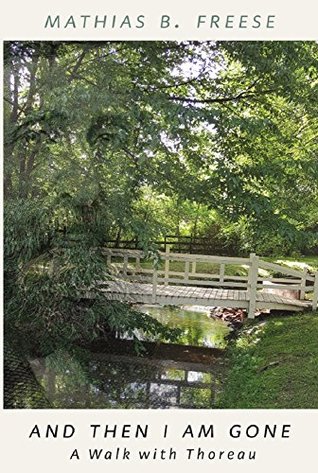 And Then I Am Gone: A Walk with Thoreau tells the story of a New York City man who becomes an Alabama man. Despite his radical migration to simpler living and a late-life marriage to a saint of sorts, his persistent pet anxieties and unanswerable questions follow him. Mathias Freese wants his retreat from the societal "it" to be a brave safari for the self rather than cowardly avoidance, so who better to guide him but Henry David Thoreau, the self-aware philosopher who retreated to Walden Pond "to live deliberately" and cease "the hurry and waste of life"? In this memoir, Freese wishes to share how and why he came to Harvest, Alabama (both literally and figuratively), to impart his existential impressions and concerns, and to leave his mark before he is gone.
And Then I Am Gone: A Walk with Thoreau tells the story of a New York City man who becomes an Alabama man. Despite his radical migration to simpler living and a late-life marriage to a saint of sorts, his persistent pet anxieties and unanswerable questions follow him. Mathias Freese wants his retreat from the societal "it" to be a brave safari for the self rather than cowardly avoidance, so who better to guide him but Henry David Thoreau, the self-aware philosopher who retreated to Walden Pond "to live deliberately" and cease "the hurry and waste of life"? In this memoir, Freese wishes to share how and why he came to Harvest, Alabama (both literally and figuratively), to impart his existential impressions and concerns, and to leave his mark before he is gone.
**
The latest memoir from Mathias Freese shares a group of essays that work to examine, share, criticize, wonder, and, most of all, ask questions that don't necessarily have answers. At seventy-six years old, Freese is starting over with a house in the woods that cost a lot more than Thoreau's jealousy-inducing twenty-eight dollar shack of peace. However, the house itself represents the offering of a simpler life, even if it comes with a heavy restoration bill.
The idea behind this memoir seems to be connecting with Thoreau but also connecting with the self. Freese writes about his health problems and the health problems of his wife. He shares words of wisdom as well as words of heavy criticism, including criticism of the political climate the U.S. is currently experiencing. However, the heaviest subject that Freese explores is that of his own impending death. Not that he's dying of a specific disease or cause, but he is slowly moving toward the end of the lifespan of a typical human being. With that added weight, Freese questions his self while examining his personal discoveries and sharing what brings him joy.
My favorite parts of this memoir were when Freese focused on his own writing. His process and reason for writing were incredibly interesting to me and I found myself most absorbed in the essays that tackled this subject. Or included it. Maybe it's the writer in me or the student, but when Freese shared his experiences with bits of writer's block as well as his personal motives for writing, I felt engaged with the essay, not just connected to the writer.
Though Freese only focuses directly on Thoreau in the opening and closing essays, Thoreau's influence runs throughout the entire collection. While I was reading, I found myself and my feelings coinciding with what Freese was examining. I laughed, I felt joy, I felt fear. Though I did expect a little bit of a hint toward or focus on feeling peace, that was not Freese's purpose for sharing these essays, at least not that I gathered.
After reading this collection, I felt that Freese's purpose for writing these essays was to get to know himself as a man who is reaching the end of his life, as well as share what influenced him and question his own experience. However, I do wish I'd read more of Thoreau's Walden then just excerpts before reading this memoir. I felt like I could have better connected with Freese had I read the entire book. Regardless, it was an interesting memoir that doesn't seem to fit in the genre of journal or autobiography. And Then I Am Gone is really a subjective interpretation of what could be the final leg of Freese's journey, though it doesn't have as many answers or conclusions a reader might expect. It offers the questions so that the readers can decide the answers. I think readers who enjoy internal exploration and perhaps those who enjoy philosophical meanderings would like reading this memoir.
Rating: 3.5/5 Cups





No comments:
Post a Comment